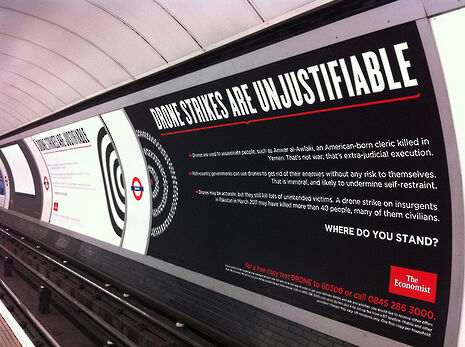On the drone campaign in Pakistan
Zara Shahid a student at Lahore University of Management Science in Pakistan, on why she values student activism on unofficial drone warfare

For the people of Waziristan, a remote mountainous region in northwest Pakistan, the drone is a symbol of fear, of an insecurity that does not let them sleep at night and has many adverse psychological effects. The drone reminds them of the day they lost a loved one, the drone hovering overhead tells them that their loved ones are not safe.
Zubair, the 16 year old grandson of Manana Bibi, who lost her life in a drone attack, told me that he used to sit with his grandmother and share stories out in the orchard when the sky was blue. They loved the blue sky. Manana Bibi was killed one such day. After that, he said, he doesn’t like to see the sky blue and hopes that the days are cloudy so that they would not know it when a drone buzzes overhead and kills them too. This is the extent to which drones have devastated the lives of Pakistani citizens.
As students we are taught to look past sentimentality and critique things from a logical perspective. Ergo, our reaction to drones will slightly differ from what some people in the public might feel. However, because drone strikes are wrong on the grounds of loss of sovereignty and human rights violations, and have led to heavy civilian casualties, in the mind of a student from Pakistan there is unison in the argument against drones and the feelings associated with the catastrophe.
The students of Pakistan have historically been very critical of the country’s foreign policy; we feel that it has made us less safe and has compromised our self-respect as a nation. But drone strikes represent the epitome of this emotion. Any super power can send a drone to kill anyone in our country, there is no trial or accountability and our government does not want to and cannot do anything to protect its own citizens. The irony of it is that the US is not even at war with Pakistan and yet every man above the age of sixteen living in Waziristan is a suspected terrorist who can be murdered any time the drone operator sitting in Nevada wills it. Can Pakistan drone anyone in the US or UK even if he is convicted of terrorism activities in a court of law? No we cannot.
These feelings, arguments and stories provided impetus for Pak Ser Zameen, the organisation that we have set up as a forum for students to protest for positive change in Pakistan. Disillusioned by the hopelessness, we felt that our solution lay not in apathy but in action, not in criticism but in activity. Our vision is for a just, peaceful, tolerant and educated Pakistan.
Drone strikes in Pakistan are our first focus. We feel that students can strategically mobilize the anti-drone sentiment in Pakistan and exert pressure on governments to ground killer drones. As we chalked out our plan we realised that a reason many people would not do anything to criticize drones is because they have not been touched by it on a personal level. Drone victims are ‘collateral damage’, not stories and feelings. To address this, we are organizing screenings of Brave New Film’s ‘Unmanned’. Unmanned goes beyond numbers and labels to voice the stories and make ‘collateral damage’ something more personal; Tariq Aziz is no longer a number, but a 16 year old boy who loved football. What happened to Tariq later will induce the audience to think about the ethical, moral and personal implications of drones. The government of Pakistan is very reluctant to give information about the victims, so it is crucial to get their stories directly from them.
As we mount our campaign against drones there is criticism from some factions of the intelligentsia and Pakistani media. Despite this, we are adamant to continue because of the simple reason that when somebody comes forward to tell their story of loss at the hands of the drones it becomes incumbent upon us to take their story to the largest audience possible so more people don’t become victims.
 News / Report suggests Cambridge the hardest place to get a first in the country23 January 2026
News / Report suggests Cambridge the hardest place to get a first in the country23 January 2026 News / Reform candidate retracts claim of being Cambridge alum 26 January 2026
News / Reform candidate retracts claim of being Cambridge alum 26 January 2026 News / Cambridge ranks in the top ten for every subject area in 202623 January 2026
News / Cambridge ranks in the top ten for every subject area in 202623 January 2026 Comment / Cambridge has already become complacent on class23 January 2026
Comment / Cambridge has already become complacent on class23 January 2026 News / Students condemn ‘insidious’ Israel trip23 January 2026
News / Students condemn ‘insidious’ Israel trip23 January 2026








